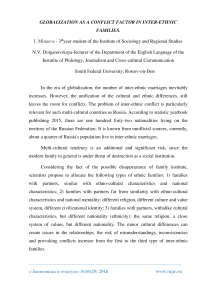Globalization as a сonflict factor in inter-ethnic families
Автор: Minaeva I., Dolganovskaya N.V.
Журнал: Экономика и социум @ekonomika-socium
Рубрика: Основной раздел
Статья в выпуске: 10 (29), 2016 года.
Бесплатный доступ
Короткий адрес: https://sciup.org/140116126
IDR: 140116126
Текст статьи Globalization as a сonflict factor in inter-ethnic families
N.V. Dolganovskaya-lecturer of the Department of the English Language of the Instutite of Philology, Journalism and Cross-cultural Communication
South Federal University, Rostov-on-Don
In the era of globalization, the number of inter-ethnic marriages inevitably increases. However, the unification of the cultural and ethnic differences, still leaves the room for conflicts. The problem of inter-ethnic conflict is particularly relevant for such multi-cultural countries as Russia. According to statistic yearbook publishing 2015, there are one hundred forty-two nationalities living on the territory of the Russian Federation. It is known from unofficial sources, currently, about a quarter of Russia's population live in inter-ethnic marriages.
Multi-cultural tendency is an additional and significant risk, since the modern family in general is under threat of destruction as a social institution.
Considering the fact of the possible disappearance of family institute, scientists propose to allocate the following types of ethnic families: 1) families with partners, similar with ethno-cultural characteristics and national characteristics; 2) families with partners far from similarity with ethno-cultural characteristics and national mentality: different religion, different culture and value system, different civilizational identity; 3) families with partners, withalike cultural characteristics, but different nationality (ethnicity): the same religion, a close system of values, but different nationality. The minor cultural differences can create issues in the relationships, the risk of misunderstandings, inconsistencies and provoking conflicts increase from the first to the third type of inter-ethnic families.
Every family - it's not a static formation, the dynamics of family relationships are built around the interaction between the spouses, children and relatives. From the first sight it seems, the process of globalization in general softens the authoritarian style and forces the tendency of democratization of relations in the inter-ethnic families, however, thetrend of return to an authoritarian relationship is being caused by the inclusion of Asian and African countries in the process of globalization.Such contradictions raise an uncertainty in many families, since the choice of what type of the family to stick with becomes more complicated and vogue.
There are numbers of features that distinguish ethnic family from families where both spouses belong to the same ethnic community. Those factors can be divided into internal, every spouse has own special family vision built in accordance with its affiliation to a particular ethnic group, and external factors,such as ethnic stereotypes.
The causes of conflicts in inter-ethnic families often become the differences that make inter-ethnic family special from the other ones, for example different religion, culture, value systems and different civilization features.Usually, toresolvetheconflictsintheinter-ethnic families gets extremely hard, since they reach a high level of emotional background. If ethnic traditions do not allow the divorce, the tensions inside of the family may last for years, destroying the spouse’s personalities and negatively affecting children.
Whether society and the government are ready to resolve such conflicts? The answer is disappointing: most are not ready. The process of globalization cannot keep up with the issues caused by itself.
Fortunately, the are some obvious solutions. First of all, provide youth with the knowledge about ethnic cultures. Then, the formation of a system of mediation, focused on the resolution of conflicts in inter-ethnic families. And the creation of a tolerant multicultural society with an appropriate system of values.
Список литературы Globalization as a сonflict factor in inter-ethnic families
- Statistical Yearbook of Russia, the Federal Service of State Statistics -2015.
- Valiullin, V.R. National and international problems as a result of internal ethnic stratification//Vestn. Adygea. state. Univ. Ser. Regional Studies: philosophy, history, sociology, law, political science, cultural studies. -2014.


